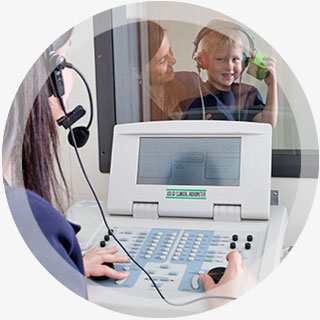Hearing Test / Hearing Testing
The hearing tests, normally undertaken in a soundproof room, encompassing both sound and speech discrimination testing.
1. Pure tone audiometry:
Is a hearing test that determines the degree, shape and type of hearing loss present in each ear. It uses a series of pure tones to identify the softest level you can hear across a range of frequencies in each ear.
2. Speech Audiometry:
Is a hearing test used to indicate speech understanding at various volumes and with and without the presence of background noise. You will be asked to repeat a series of words in each ear under headphones. These words are often presented at a normal conversational level and then with amplification, to help the audiologist assess if a hearing aid would be of benefit to you.
3. Tympanometry:
This test is is to assess your middle ear function (i.e., how well your eardrum is moving and the reflexive responses of the middle ear muscles). This quick and painless test can identify if there is a perforation in the eardrum, middle ear fluid, patent grommet, Eustachian tube dysfunction, or other medical conditions.
4. Otoacoustic Emission Testing:
This type of hearing test measures an acoustic response produced by the inner ear in response to a sound stimulus. The test is performed by placing a small probe into your ear. Sounds are generated in the probe and responses that come back from the inner ear are recorded. The test is used in a number of different ways to test your hearing.
5. Auditory brainstem response (ABR) audiometry:
This is an objective neurologic test of auditory brainstem function in response to auditory (click) stimuli. This test gives information about the inner ear and brain pathways for hearing. The test can be used with children or difficult to test patients. The test is also indicated for patients with signs or symptoms suggesting a type of hearing loss that involves brain pathways. The test is performed by attaching electrodes on the head and recording brain wave activity in response to acoustic signals. No responses are necessary; the patient being tested rests quietly or sleeps while the test is performed.
6. Online Hearing Tests:
Online Hearing Test help you to make a simple evaluation of your hearing health and determine if you need to have a formal hearing assessment with an audiologist. Online hearing tests are by no means a replacement for a thorough diagnostic hearing evaluation, but they can be a good starting point if you are unsure whether you need to make an appointment.
7. Hearing Test Results
Once you have completed the series of hearing tests your audiologist will present you with a thorough explanation of your test results. If we have identified a hearing loss, we will discuss your options, including whether you require any medical or surgical treatments, and make some hearing aid recommendations suitable to your individual circumstances.

BOOK A CONSULTATION